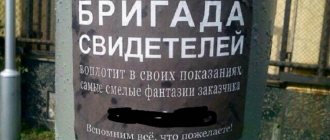The picture was taken from the Internet
Greetings, my dear readers!
We kindly ask you to like and leave your comment under this article, your opinion is very important!
The current criminal legislation represented by the Criminal Code of the Russian Federation provides for criminal liability for a citizen for knowingly false denunciation of the commission of a crime. Article 306 of the Criminal Code of the Russian Federation includes three parts that establish criminal penalties for knowingly false denunciation of a crime.
Criminal penalties for knowingly false denunciation
1) For a knowingly false denunciation of a crime, a citizen faces:
• a fine of up to 120,000 rubles;
• compulsory work for up to 480 hours;
• corrective labor for up to 2 years;
• forced labor for up to 2 years;
• arrest for up to 6 months;
• imprisonment for up to 2 years.
2) For a knowingly false denunciation associated with accusing a person of committing a grave or especially grave crime, a citizen faces:
• a fine in the amount of 100,000 to 300,000 rubles;
• forced labor for up to 3 years;
• or imprisonment for up to 3 years.
3) For a knowingly false denunciation involving the artificial creation of evidence of accusing a person, a citizen faces:
• forced labor for up to 5 years;
• imprisonment for up to 6 years.
In this case, a person presents false evidence accusing a person of committing a crime or simply falsifies such evidence.
Knowingly false denunciation of an administrative offense
In a specialized administrative court, the plaintiff brought in a witness who allegedly saw the offense; the witness testified in court against the defendants. However, at the court hearing, the plaintiff’s arguments were not confirmed; moreover, it was established that the witness’s explanations do not correspond to the circumstances of the case and cannot be evidence in court, since the very presence of the witness at the scene of the incident is refuted by video footage from a surveillance camera. The case against the defendants was dismissed.
Further, the defendants wrote a statement to the authorities to initiate proceedings against the witness under Article 420 of the Criminal Code for false denunciation. The case was closed due to lack of evidence of a crime. After contacting the city prosecutor's office, the case was reopened and closed again due to the lack of a criminal offense in the act.
From the resolution to terminate the pre-trial investigation: “... According to the disposition of p.419 of the Criminal Code of the Republic of Kazakhstan, criminal liability under this article occurs for a knowingly false denunciation of the commission of a criminal offense or a criminal offense, also according to the disposition of p.420 of the Criminal Code of the Republic of Kazakhstan, criminal liability for knowingly false testimony of a witness occurs for knowingly false testimony of a witness, in court or during a pre-trial investigation carried out when a criminal offense is committed. In addition, for knowingly false testimony of a witness to an authority when considering a case of an administrative offense and during an examination of medical activities, administrative liability is provided for under Article 659 of the Code of Administrative Offenses of the Republic of Kazakhstan. Thus, the witness’s testimony was given during the consideration of an administrative offense in a specialized administrative court and was given regarding the commission of an administrative offense by a person, which excludes his prosecution.”
We ask you for advice: are the actions of the interrogator legal? Is it possible to prosecute a witness for false denunciation? Which article in the law should I rely on?
If the case is dismissed twice, it turns out that a person is illegally accused of committing an illegal act, reporting publicly at a court hearing and to law enforcement agencies in writing and orally about a person’s unworthy behavior from the point of view of the law, reporting unconfirmed information about the commission of offenses, is the norm of life and does not need in need of legal protection, and anyone can slander any person?!
In what case can a denunciation be considered false?
A report made orally or in writing about the commission of a crime is considered false if it is not true. Such a message may refer to the event of a crime or may be expressed in attributing it to a specific person, or in accusing a person not involved in the commission of an actual crime, or in a more serious crime than what was actually committed. The falsity of a report of a crime must cover factual circumstances, and not their legal assessment.
What is the social danger of this crime?
The public danger of this criminal act lies in the fact that the person who makes a report about the commission of a crime misleads law enforcement agencies, and law enforcement agencies are obliged to conduct a procedural check on this report about the commission of a crime. Undoubtedly, law enforcement agencies spend a large amount of time, material resources, as well as the efforts of their own employees, which are aimed at investigating crimes that were not committed at all. A knowingly false denunciation is a crime that harms the investigation of actual crimes. At the same time, it must be said that the interests of other participants in criminal proceedings are affected, who spend their own time participating in investigative activities and, not to mention the fact that innocent people end up behind bars for something they did not do at all.
Deliberately false denunciation. Article 306 of the Criminal Code of the Russian Federation.
Most citizens of our country are quite serious about being extremely honest in the police/police and any other law enforcement agencies (at least I really want to believe so). However, sometimes situations arise when a person clearly realizes that no crime was actually committed against him, but he really wants the police to take “preventive action” measures against this or that person, or, for example, to find someone who was lost by an absurd accident mobile phone, because in the latter case the police are not obliged to carry out a set of search measures.
Everyone’s motives are different, but the essence comes down to one thing: a person goes to the police with a statement that contains false information and the person who declared it knows about it and is aware of this fact, despite the punishability of such actions in accordance with Art. 306 of the Criminal Code of the Russian Federation.
Article 306 of the Criminal Code of the Russian Federation: Knowingly false denunciation 1. Knowingly false denunciation of the commission of a crime is punishable by a fine in the amount of up to one hundred twenty thousand rubles or in the amount of the wages or other income of the convicted person for a period of up to one year, or by compulsory labor for a term of one hundred eighty to two hundred forty hours, or correctional labor for a term of up to two years, or arrest for a term of up to six months, or imprisonment for a term of up to two years.2. The same act, combined with accusing a person of committing a grave or especially grave crime, -
shall be punishable by a fine in the amount of one hundred thousand to three hundred thousand rubles, or in the amount of the wages or other income of the convicted person for a period of one to two years, or by imprisonment for a term of up to three years.
3. Acts provided for in parts one or two of this article, combined with the artificial creation of evidence of accusation, -
shall be punishable by imprisonment for a term of up to six years.
Turning to the theory of criminal law, you can find out that in order to bring a person to criminal responsibility for a knowingly false denunciation, it is quite enough to even make a phone call to number “02” and verbally report the crime committed. From a practical point of view, I am not aware of cases of criminal cases sent to court in a similar situation. In all criminal cases that were sent to court under Art. 306 of the Criminal Code of the Russian Federation, persons brought to criminal liability were warned in writing for knowingly false denunciation. That is why the procedural application forms contain columns stating that the person has been warned of criminal liability for deliberate denunciation under Art. 306 of the Criminal Code of the Russian Federation, in which the applicant also separately puts his signature.
We should not forget that statements about a crime can also be made during the interrogation of participants in pre-trial proceedings, which are subject to inclusion in the protocol of the investigative action, and in this case the investigator often does not explain the provisions of Art. 306 of the Criminal Code of the Russian Federation, which would not hurt to do, of course.
A criminal case against the unfortunate applicant can be initiated both during the inspection, if this fact is established immediately, and after the initiation of a criminal case based on a false statement. In the event that a criminal case was nevertheless initiated based on a false statement, then it is subject to termination and a decision is made to initiate a new criminal case, and the first case will already be one of the evidence of guilt.
As I previously mentioned, the most typical motive for deliberately false denunciations among our citizens today is related to the loss of mobile phones.
Here’s an example: a man is relaxing in a restaurant in the company of his friends, while his communication is brightened up with a good portion of the green snake, and suddenly morning has come... My head doesn’t remember what happened, but looking at the contents of my pockets reveals the shortage of a brand new mobile phone for 10 rubles. Trouble. Robbed. Where is the world heading? They steal almost in broad daylight. What to do? Call the police and report theft.
With grief in half, the police officers establish the time of the “theft” and initiate a criminal case. In the course of operational search and investigative actions, the person who uses the mobile phone is identified and it turns out to be a schoolboy living in a neighboring house to the restaurant where the applicant was relaxing. A schoolboy found this phone in the grass this morning on the way to school with his three friends.
Additional questioning of the applicant’s friends confirms that the latter actually went to the lawn in front of them, where he fell several times. They didn’t talk about this earlier because they didn’t remember, but after the police officers, based on the testimony of the boy and his friends, asked about the lawn, so they immediately remembered.
From the above example it clearly follows that the person made a knowingly false denunciation and should be prosecuted under Art. 306 of the Criminal Code of the Russian Federation. At the same time, the argument: “I was drunk and don’t remember anything” cannot be recognized as an objective circumstance of the absence of deliberate falsity when filing a statement. Just imagine, if such an argument could be an objective circumstance for the absence of guilt, then how many people would need to be released from criminal liability? Exactly as many crimes were committed while intoxicated, and this, excuse me, will be anarchy: he got drunk, committed a crime and seems not to be guilty, since he doesn’t remember anything, and if he doesn’t remember, it means it didn’t happen.
I'm not ready to help answer the question: What to do if you lost your cell phone? Or: How to return a lost cell phone? This is not my profile at the moment.
We kindly ask all citizens to take your words and statements seriously, think about the possible consequences, I previously wrote in my post “How to withdraw a statement from the police” that this cannot be done. Today our employees are frankly lazy to initiate criminal cases under Art. 306 of the Criminal Code of the Russian Federation, since they are not very simple to prove and these cases do not always go well in the courts with a guilty verdict (the example I gave above is also from this series and I am ready to shake the hand of the investigator or interrogator who, in such a situation, manages to bring the case about knowingly false denunciation before approval of the indictment). Wherein. At any moment, more active work may begin in order to reduce the number of discontinued criminal cases. But it is precisely because of false statements that today a large number of criminal cases are being dismissed, and for this the “big” leadership does not pat them on the head and rewards the heads of investigative bodies at all levels with disciplinary sanctions. And when this work does begin, they may remember all the false applicants over the past few years.
In continuation of the topic , based on numerous requests from readers, I suggest reading the article “How to initiate a criminal case under Article 306 of the Criminal Code of the Russian Federation (for knowingly false denunciation).”
I also suggest that you familiarize yourself with the selection of court decisions under Article 306 of the Criminal Code of the Russian Federation, where, among other things, there are decisions with the given example about the loss of a mobile phone.
Further discussion of this post is possible only within the framework of a specially created topic on the forum.





